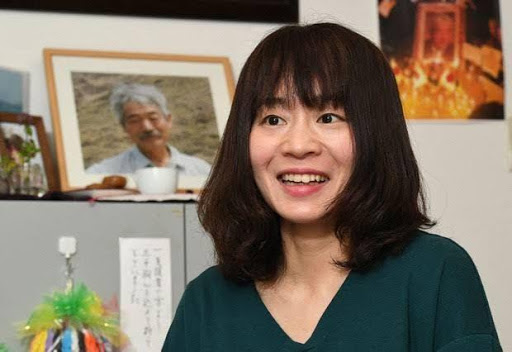Following the December 2019 fatal shooting in Afghanistan of Japanese humanitarian Dr. Tetsu Nakamura, his eldest daughter Akiko has started helping with work at his former organization.
June 4 marked half a year since the death of 73-year-old Nakamura, who devoted around 30 years of his life to developing health care and farming in Afghanistan. Speaking to the Mainichi Shimbun from the office of the nongovernmental group Peshawar-kai, where a picture of her father hangs, 39-year-old Akiko said calmly, “I want to do what I can as a member of the organization.”
One of five siblings, Akiko lives with her mother Naoko at their home in the Fukuoka Prefecture city of Omuta where Dr. Nakamura would stay during periods when he was back from Afghanistan. In January, she started heading into the group’s office in the city of Fukuoka.
There, 30-plus full-time employees and volunteer workers support the group’s activities by coordinating contact with some 100 staff members working in Afghanistan, and engaging in fundraising and newsletter publication, among other tasks. Akiko works for the organization about twice a month while also being employed as clerical staff at a medical institution, and is learning about the group’s business and activities in Afghanistan.
Akiko said that she had had a vague interest in the organization’s activities before joining. When her father was alive, she would read his books, and also secretly attended his lectures even though he told her not to because he felt embarrassed. But she put herself at a distance from the group partially due to reservations about a father and daughter working together. She also said that she didn’t want to be in her father’s way.
Her feelings changed when she went to Afghanistan for the first time with Naoko and others to attend Dr. Nakamura’s funeral. They were welcomed by President Ashraf Ghani, and a portrait of her father was drawn on the plane. Despite his profession as a doctor, he often said, “One irrigation canal is needed more than 100 clinics,” and would drive excavators himself to build waterways in the drought-stricken country.
“The people of Afghanistan recognized my father’s efforts. I got a new sense of how amazing the things my dad did are,” Akiko said. Once things had calmed down after the funeral and other parts of the process, she got in touch with the Peshawar-kai to ask if there was anything she could do to help them.
Her father would spend almost all year in Afghanistan, and was home in Japan for about a quarter to a third of the year. When he was home, he would talk about how it had been living in Afghanistan, but he rarely spoke about the work itself.
Akiko remembers seeing him at home drawing blueprints for waterways. He once asked her to lend him a math textbook, because he needed to learn about calculus for his work; she gave him one from her high school days. “When it was time for him to go back, I’d feel I just want him to take care, whatever happens,” she said.
Whenever Dr. Nakamura returned, the family would eat his favorite dish, pork cutlet curry. Now when it’s served at home, everyone talks about how he used to love it. Akiko said that while “there is a loneliness that comes when thinking about him,” since becoming involved with the group’s activities, she feels “like I have a sense that I’m closer to who Tetsu Nakamura was.”
“Even now, I feel like he’ll just reappear back home. It’s as if he’s just been away for a much longer time.” In the garden of their home, the blueberries Dr. Nakamura planted will soon be ready for picking.













